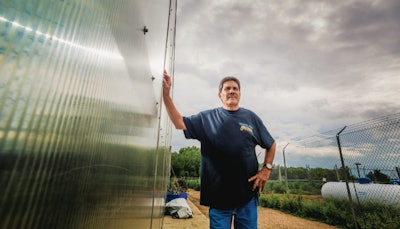
Mike Stetler, owner of Marisol Therapeutics and Gardens in West Pueblo, Colo., is very aware that his approach to growing marijuana differs from many commercial cultivators in the industry—and he’s fine with that. A fourth-generation grower, Stetler’s approach to cultivation and to the plants themselves is greatly influenced by his spiritual connection and ancestral heritage.
“I’m a Mescalero Apache Indian, and so it’s been taught to us through our generations, our uncles and grandfathers, my grandmother,” Stetler says. As part of his preparation and education for cultivation, he researched as far back as the 1800s to find out what his ancestors did with marijuana, how it was grown and how it was used. That background informs his approach to marijuana as medicine today. “To us Native Americans, this is a way to cure, just like peyote is to us. It’s a medicine,” he explains.
While many cultivators seek counsel before entering the industry, Stetler’s path and motivation was likely different than most as well. “I prayed for it a lot. … I went and asked permission with my elders, and I got permission to do this. So, to me it’s different than anybody else,” he says. “To me, it’s trying to make this world different, for there to be more peace and love in this world instead of bombings and war and pharmaceuticals.”
Stetler makes a clear distinction between medicine, which includes marijuana, and drugs. “Medicine is the herbs and stuff derived from Mother Nature, the things that the Creator gave us. Drugs are what I call the things coming into the world through pharmaceuticals,” he says. “I take a different approach—that every living life is precious. That’s the way that I take it, and that’s the way that I’ve taken it from the beginning when I started in this industry.”
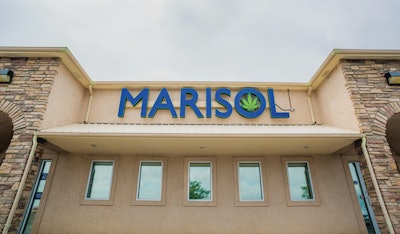
Advocacy and Healing
Like other pioneers in Colorado’s cannabis cultivation industry, Stetler’s active involvement in advocating for legalization in the state dates back decades. “I’ve been doing this, trying to fight this since 1996,” he recalls. When Colorado’s first medical marijuana law finally passed in 2000, caregivers and patients gained authority to possess, use and cultivate medical marijuana. Stetler began cultivating as a legal caregiver, and he’s been bringing his medicine to the people ever since.
Around 2006, Stetler began dispensing on a larger scale as the awareness of marijuana’s healing properties and the demand for quality medical marijuana grew. While the state went back and forth on patient limits for caregivers, Stetler and other caregivers continued to dispense medicines to a growing number of patients. During this time, Stetler gained some unwelcome attention when helicopters descended on his licensed caregiver operation and 44 plants were seized, even though he was licensed for 56.
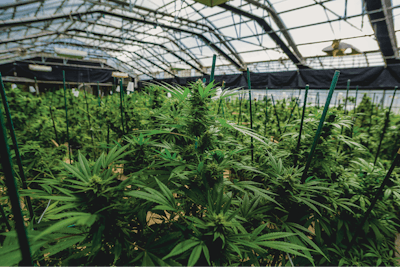
Heavy media coverage of Stetler in the raid’s aftermath turned him into what he calls “the poster boy” for marijuana. Though opportunities for civil lawsuits arose and Stetler’s plants were never returned, he chose to take a bad situation and turn it into good. “I said, ‘No, we’re going to take the high road. We’re going to work with our police officers and our district attorney,’” he recalls. He established an open-door policy for police and media to come in and see everything he was doing. The precedents set at that time have paid back over the years, and his relationships with law enforcement and the community remain strong.
About the same time as Stetler’s raid-related woes unfolded, unrelated legal action in Colorado effectively lifted the limit on the number of patients caregivers could serve. With caregivers able to treat as many patients as needed, the action opened the door for caregivers to dispense openly from storefronts. Marisol Therapeutics—the name derived from “marijuana solutions”—officially launched its first storefront dispensary in 2008.
One of Stetler’s earliest patient encounters still fuels his passion to share medicine. “When we first opened our store, one of the first patients that came in had Tourette syndrome,” he recalls. “I was over there medicating him—this is when we could medicate in stores—and I gave him some tinctures and things, and pretty soon tears started coming down his [face].” At first, Stetler thought he had done something wrong; then the patient explained—it was the first time he’d ever felt normal. The way Stetler felt as he realized the man had stopped shaking stays with him nearly a decade later. “That warmness that gets in your soul is way better than any kind of money that I could make or anything like that,” Stetler says.
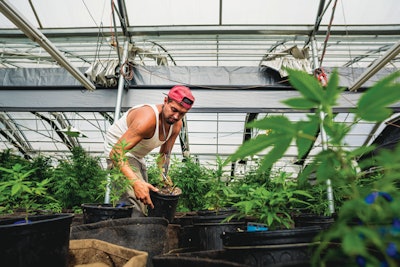
Marisol Today
Stetler’s dispensaries and cultivation facilities today bear little resemblance to those of the Marisol launch in 2008, but Stetler’s devotion to sharing his medicine is unabated. The medical dispensary known as Marisol Therapeutics operates alongside a recreational dispensary called Marisol Gardens, all housed in the same West Pueblo building with Marisol’s two kitchens. Stetler’s cultivation facilities include a 20,000-square-foot greenhouse grow plus an 8-acre outdoor grow. Last year, Stetler’s outdoor grow was in pots, but this year, plants are in the ground.
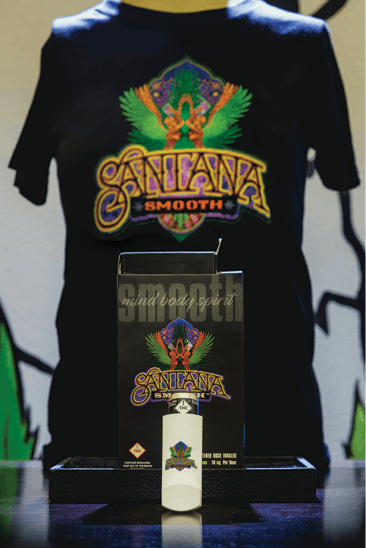
Stetler doesn’t discuss specific growing methods or production figures with anyone outside of his closest associates and staff, but he readily shares his broader approach to growing. Everything is designed to be as organic as possible. “We try to use just water or, maybe, if we run into some problems, some Safer soap or something like that, but that’s all,” he explains. In a time when many cultivators are turning to increased technology to cut labor costs and increase profits, Stetler remains committed to doing things by hand, one on one with each plant.
In Marisol’s outdoor grow, plants are irrigated by what Stetler refers to as “the old farmers’ way,” using irrigation pipes and gates, with plants in rows like corn. In the greenhouse, however, plants are watered manually. “We hand water everything,” Stetler says. “When they hand water, they pay attention to the water temperatures. They pay attention to how much food they put in there or how much they don’t. They pay attention to that individual plant.” That degree of personal attention is Stetler’s goal. “Instead of looking at it as a whole garden, I want them to look at … each plant, because each plant has its own characteristics. Each plant has its own way you treat it.”
This one-on-one, hands-on approach isn’t optional for Stetler. “I have to do it. Each individual plant is precious to us, because that individual plant goes out to help other people with cancer, with seizures, with MS, with glaucoma, with different types of headaches,” he explains. Stetler notes that all growers use one of a handful of basic growing methods, but he feels it’s the extra care plants receive that make the difference. “It’s what you put into them,” he says. “The best thing for the plant is how you take care of it. That’s why I have them water each plant individually. If there’s anything happening to it, they can just take care of the situation immediately.”
Marisol runs with about 25 regular employees. That number swells to around 75 when hired trimmers come in at harvest. “We hand-trim everything,” Stetler says.
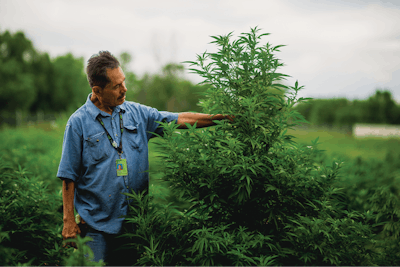
Freedom of Choice
Stetler works to provide his patients and customers with a wide range of products to meet every need. Marisol produces many products themselves, including a signature White Buffalo line and a line of lotions that is undergoing rebranding now. The company is known for its high-quality extracts, among other products. “We produce our White Buffalo tar and our lotions. We’ve got distillants, suppositories, shatter, different kinds of waxes. We’ve got inhalers and the vape pens,” Stetler says. They also have a new medicated candy bar that’s just being released that he compares to a Black Cow candy bar.
Marisol wholesales to other retailers, and it brings in product from a variety of other producers. “I believe that this … isn’t our store; this is a people’s store,” Stetler says. “It doesn’t matter what I like or what my employees like. It matters what the customers like and our patients like.” With each patient and each customer being different, with different tastes and different needs, Stetler strives to serve those needs. “We get all kinds of things, as much as we can from others, and put them in a store so our customers can have freedom of choice,” he says.
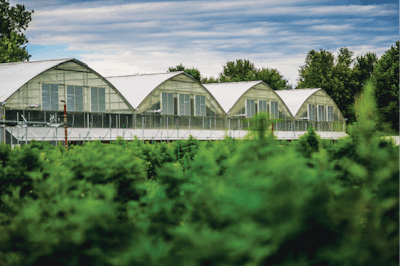
Celebrity Branding
Though branding is becoming more common in the cannabis industry, Stetler has been a leader in celebrity branding. In a branding arrangement with Tommy Chong, Stetler developed a hybrid strain of high-THC cannabis launched in 2014 called AK Chong Star. Though the strain is no longer proprietary, Marisol remains well known for the branding and the strain. Stetler’s latest celebrity alliance is with musician Carlos Santana and the branded line of Santana Smooth inhalers in balanced THC:CBD and high-THC choices.
“That finally came to fruition about a year and a half ago, after I’ve been trying to get Carlos Santana for about 10 years,” Stetler says. “Finally we met on good grounds, where we were both on the same level, and he agreed that we have to start putting out peace and love around this world. We have to start putting out medicine that won’t kill our elders or hurt our children like the opiates.” Stetler’s and Santana’s shared focus on mind, body and spirit is behind plans for additional products and branding efforts between the two. “We’re trying to get this known to the world, that … you’ve got freedom of choice, taking drugs or taking medicine,” Stetler explains.
Industry Changes
Through his years of growing marijuana, Stetler has seen many changes as the industry moved out of hiding toward medical legalization and finally to legal recreational use. Over the years, he has remained actively involved in supporting marijuana initiatives, testifying before legislative committees, and building bridges between the marijuana industry and the communities where they live and serve.
Marijuana reform advocate Mason Tvert, former director of communications for the nation’s largest marijuana policy organization, the Marijuana Policy Project, acknowledges Stetler’s contributions through the years. “He was certainly supportive of the work we were doing to legalize and regulate marijuana with Amendment 64. He was one of the more active and supportive cannabis business owners and tremendously helpful in the efforts for legalization in 2012,” Tvert says.
While Stetler is pleased at the industry’s progress, not all the changes sit well with him. “I’ve seen it change from being peace and love to greed-hungry people, from the government all the way down to people just getting in this industry now. I’m not saying that’s all of them, but [those are] the changes I have seen,” he says. “Right now it’s all money. It takes so much money to get in this industry and keep up with the Joneses per se, because if you don’t, you’re not going to go anywhere. When I got into it, you didn’t need money. You didn’t need cameras. I just rented a store, got a cash register and that was it. I opened.”
Stetler isn’t slowing down in sharing his vision for medicine, recreational and otherwise. “My prayers, my hopes, my wishes are to have this medicine all over the world,” he says. “Even when it’s recreational, it’s still medicine, because the plant doesn’t know any different. It doesn’t know that on the medicine side, it needs to help people, and on the recreational side, it needs to get people high. It doesn’t know that. All it knows is to go into our system and help. … I call it brand-new medicine that is a thousand years old.”















